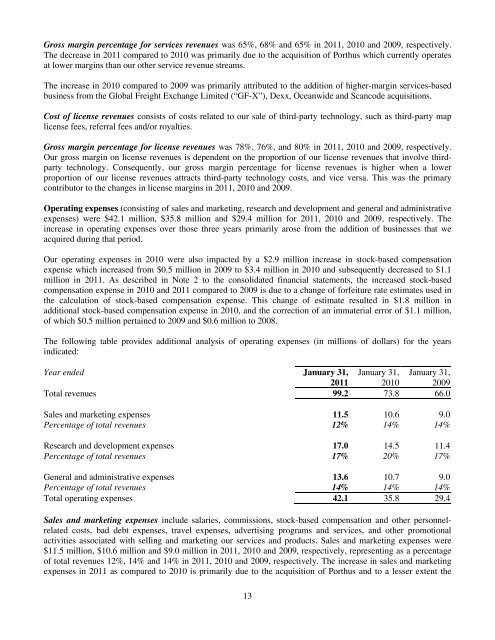THE DESCARTES SYSTEMS GROUP INC.
THE DESCARTES SYSTEMS GROUP INC.
THE DESCARTES SYSTEMS GROUP INC.
Create successful ePaper yourself
Turn your PDF publications into a flip-book with our unique Google optimized e-Paper software.
Gross margin percentage for services revenues was 65%, 68% and 65% in 2011, 2010 and 2009, respectively.<br />
The decrease in 2011 compared to 2010 was primarily due to the acquisition of Porthus which currently operates<br />
at lower margins than our other service revenue streams.<br />
The increase in 2010 compared to 2009 was primarily attributed to the addition of higher-margin services-based<br />
business from the Global Freight Exchange Limited (“GF-X”), Dexx, Oceanwide and Scancode acquisitions.<br />
Cost of license revenues consists of costs related to our sale of third-party technology, such as third-party map<br />
license fees, referral fees and/or royalties.<br />
Gross margin percentage for license revenues was 78%, 76%, and 80% in 2011, 2010 and 2009, respectively.<br />
Our gross margin on license revenues is dependent on the proportion of our license revenues that involve thirdparty<br />
technology. Consequently, our gross margin percentage for license revenues is higher when a lower<br />
proportion of our license revenues attracts third-party technology costs, and vice versa. This was the primary<br />
contributor to the changes in license margins in 2011, 2010 and 2009.<br />
Operating expenses (consisting of sales and marketing, research and development and general and administrative<br />
expenses) were $42.1 million, $35.8 million and $29.4 million for 2011, 2010 and 2009, respectively. The<br />
increase in operating expenses over those three years primarily arose from the addition of businesses that we<br />
acquired during that period.<br />
Our operating expenses in 2010 were also impacted by a $2.9 million increase in stock-based compensation<br />
expense which increased from $0.5 million in 2009 to $3.4 million in 2010 and subsequently decreased to $1.1<br />
million in 2011. As described in Note 2 to the consolidated financial statements, the increased stock-based<br />
compensation expense in 2010 and 2011 compared to 2009 is due to a change of forfeiture rate estimates used in<br />
the calculation of stock-based compensation expense. This change of estimate resulted in $1.8 million in<br />
additional stock-based compensation expense in 2010, and the correction of an immaterial error of $1.1 million,<br />
of which $0.5 million pertained to 2009 and $0.6 million to 2008.<br />
The following table provides additional analysis of operating expenses (in millions of dollars) for the years<br />
indicated:<br />
Year ended January 31, January 31, January 31,<br />
2011 2010 2009<br />
Total revenues 99.2 73.8 66.0<br />
Sales and marketing expenses 11.5 10.6 9.0<br />
Percentage of total revenues 12% 14% 14%<br />
Research and development expenses 17.0 14.5 11.4<br />
Percentage of total revenues 17% 20% 17%<br />
General and administrative expenses 13.6 10.7 9.0<br />
Percentage of total revenues 14% 14% 14%<br />
Total operating expenses 42.1 35.8 29.4<br />
Sales and marketing expenses include salaries, commissions, stock-based compensation and other personnelrelated<br />
costs, bad debt expenses, travel expenses, advertising programs and services, and other promotional<br />
activities associated with selling and marketing our services and products. Sales and marketing expenses were<br />
$11.5 million, $10.6 million and $9.0 million in 2011, 2010 and 2009, respectively, representing as a percentage<br />
of total revenues 12%, 14% and 14% in 2011, 2010 and 2009, respectively. The increase in sales and marketing<br />
expenses in 2011 as compared to 2010 is primarily due to the acquisition of Porthus and to a lesser extent the<br />
13



